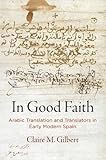In Good Faith : Arabic Translation and Translators in Early Modern Spain / Claire M. Gilbert.
Material type: TextPublisher: Philadelphia : University of Pennsylvania Press, [2020]Copyright date: ©2021Description: 1 online resource (320 p.) : 10 illusContent type:
TextPublisher: Philadelphia : University of Pennsylvania Press, [2020]Copyright date: ©2021Description: 1 online resource (320 p.) : 10 illusContent type: - 9780812297393
- online - DeGruyter
| Item type | Current library | Call number | URL | Status | Notes | Barcode | |
|---|---|---|---|---|---|---|---|
 eBook
eBook
|
Biblioteca "Angelicum" Pont. Univ. S.Tommaso d'Aquino Nuvola online | online - DeGruyter (Browse shelf(Opens below)) | Online access | Not for loan (Accesso limitato) | Accesso per gli utenti autorizzati / Access for authorized users | (dgr)9780812297393 |
Frontmatter -- Contents -- Introduction. The Arabic Voices of Imperial Spain -- Chapter 1. The Foundations of Fiduciary Translation in Morisco Spain -- Chapter 2. Families in Translation: Spanish Presidios and Mediterranean Information Networks -- Chapter 3. Translating Empires: Spain, Morocco, and the Atlantic Mediterranean -- Chapter 4. Faiths in Translation: Mission and Inquisition -- Chapter 5. The Legacies of Fiduciary Translation: Arabic Legal and Historical Sources in Golden Age Spain -- Epilogue. Imagining Fiduciary Translation at the End of Imperial Spain -- List of Abbreviations -- Notes -- Bibliography -- Index -- Acknowledgments
restricted access online access with authorization star
http://purl.org/coar/access_right/c_16ec
The century that followed the fall of Granada at the end of 1491 and the subsequent consolidation of Christian power over the Iberian Peninsula was marked by the introduction of anti-Arabic legislation and the development of hostile cultural norms affecting Arabic speakers. Yet as Spanish institutions of power first restricted and then eliminated Arabic language use, marginalizing Arabic-speaking communities, officially sanctioned translation to and from Arabic played an increasingly crucial role in brokering the administration of the growing Spanish empire and its overseas territories. The move on the peninsula from a regime of legal pluralism to one of religious and legal orthodoxy created new needs and institutions for Arabic translation, which simultaneously reflected, subverted, and ultimately reaffirmed the normative anti-Arabic language politics.In Good Faith examines the administrative functions and practices of the individual translators who walked the knife's edge, as the task of the Arabic-Spanish translator became both more perilous and more coveted during a volatile historical period. Despite the myriad personal and political risks run by Arabic speakers, Claire M. Gilbert argues that Arabic translation was at the core of early modern Spanish culture and society and that translators played pivotal roles in the administrative, institutional, and ideological development of Spain and its relationships, both domestic and international. Using materials from state, local, and religious archives, Gilbert develops the notion of "fiduciary translation" and uses it to paint a vivid picture of the techniques by which translators attempted to demonstrate their expertise and trustworthiness—thereby to help protect themselves, their families, and even their communities from the Inquisition and other authorities. By emphasizing the practices and networks of the individual translators themselves, Gilbert's social history of Arabic translation deepens our understanding of religious minorities, international relations, and statecraft in early modern Spain.
Mode of access: Internet via World Wide Web.
In English.
Description based on online resource; title from PDF title page (publisher's Web site, viewed 01. Dez 2022)


